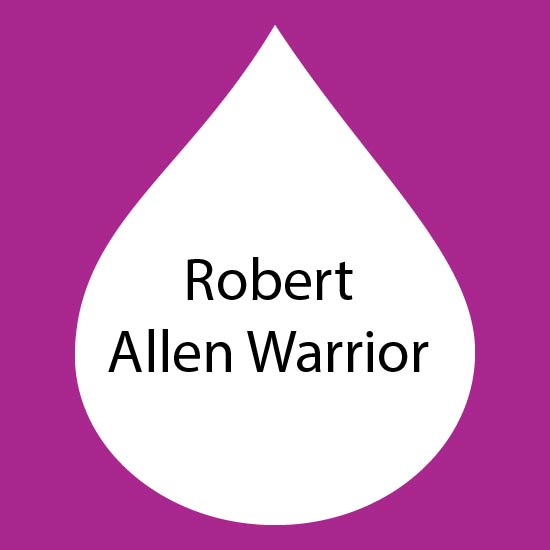Robert Allen Warrior
Title
Robert Allen Warrior
Birthplace
Grayhorse District, Osage Nation
Primary Sources
Warrior, R. (2020). Settler sidekick solidarity?: response to Lorenzo Veracini: ‘Is settler colonial studies even useful?’ Postcolonial Studies, 24(2), 283–289. https://doi.org/10.1080/13688790.2020.1857024
Warrior, R. (2020). “The Finest Men We Have Ever Seen”: Jefferson, the Osages, and the Mirror of Nativism. Comparative Literature, 72(3), 276-282. https://doi.org/10.1215/00104124-8255317
Warrior, R. (2018). FOREWORD. In J. K. Kauanui (Ed.), Speaking of Indigenous Politics: Conversations with Activists, Scholars, and Tribal Leaders (pp. ix–xii). University of Minnesota Press. https://doi.org/10.5749/j.ctv8j71d.3
Warrior, R.A (2017). Home/not home: Centering American studies where we are. American Quarterly, 69(2), 191–219. https://doi.org/10.1353/aq.2017.0014
Warrior, R.A (2014). 2010 NAISA Presidential Address: Practicing Native American and Indigenous Studies. Native American and Indigenous Studies, 1(1), 3–24. https://doi.org/10.5749/natiindistudj.1.1.0003
Jean M. O’Brien, & Warrior, R. (2014). Introduction: Indigeneity, Palestine, and Israel. Native American and Indigenous Studies, 1(2), 105–106. https://doi.org/10.5749/natiindistudj.1.2.0105
Warrior, R. (2011). THE SUBALTERN CAN DANCE, AND SO SOMETIMES CAN THE INTELLECTUAL. Interventions, 13(1), 85–94. https://doi.org/10.1080/1369801X.2011.545579
Warrior, R.A (2009). Native American scholarship and the transnational turn. Cultural Studies Review, 15(2), 119–130. https://doi.org/10.5130/csr.v15i2.2041
Warrior, R. (2003). A Room of One’s Own at the ASA: An Indigenous Provocation. American Quarterly, 55(4), 681–687. http://www.jstor.org/stable/30042001
Warrior, R.A (1995). Tribal secrets: Recovering American Indian intellectual traditions. University of Minnesota Press.
Warrior, R. A. (1992). Reading American Indian Intellectual Traditions. World Literature Today, 66(2), 236–240. https://doi.org/10.2307/40148124
Warrior, R. A. (1992). Intellectual Sovereignty and The Struggle for An American Indian Future. Chapter 3 of Tribal Secrets: Vine Deloria, John Joseph Mathews, and the Recovery of American Indian Intellectual Traditions. Wicazo Sa Review, 8(1), 1–20. https://doi.org/10.2307/1409359
Secondary Sources
Lomawaima, K. T., Mcdonough, K., O’Brien, J. M., & Warrior, R. (2021). Editors’ Introduction: Reflections on the Land-Grab Universities Project. Native American and Indigenous Studies, 8(1), 89–91. https://doi.org/10.5749/natiindistudj.8.1.0089
Kauanui, J. K. (Ed.). (2018). Speaking of Indigenous Politics: Conversations with Activists, Scholars, and Tribal Leaders. University of Minnesota Press. https://doi.org/10.5749/j.ctv8j71d
O’Brien, J. M., & Warrior, R. (2016). Building A Professional Infrastructure For Critical Indigenous Studies: An (Intellectual) History Of And Prospectus For The Native American And Indigenous Studies Association. In A. Moreton-Robinson (Ed.), Critical Indigenous Studies: Engagements In First World Locations (Pp. 33–48). University Of Arizona Press. https://doi.org/10.2307/jj.423485.6
Smith, P., Warrior, R.A. (1991). Like a hurricane: The Indian movement from Alcatraz to Wounded Knee. The New Press.
Extra Resources
Kauanui, J.K., & Warrior, R. (2018). Robert Warrior on intellectual sovereignty and the work of the public intellectual. In J.K. Kauanui (Ed.), Speaking of Indigenous politics: Conversations with activists, scholars, and tribal leaders (pp. 328–342). University of Minnesota Press. https://doi.org/10.5749/j.ctv8j71d.30
Collection
Citation
“Robert Allen Warrior,” Decoloniality, First Nations Thinkers and thought and practices from the Global South, accessed December 6, 2025, https://omeka.cloud.unimelb.edu.au/decoloniality-and-thinkers-from-the-global-south/items/show/552.
